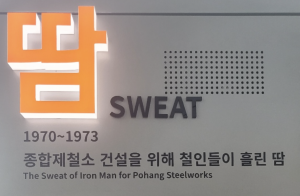Pohang: POSCO Museum
Photo essay of wall text of POSCO Museum of Pohang

The Glass Plate
sgknowlesBy Scott G. Knowles: As part of the STL Anthropocene Field Campus the research team visited the Wood Refinery Refinery History Museum on March 9, 2019. This museum is located on the grounds of the Wood River Refinery, a Shell Oil refinery built in 1917 and today owned by Phillips 66. The site is Roxana, Illinois, just upriver from Granite City, and just over two miles from the convergence of the Mississippi and Missouri Rivers. Sitting on the actual grounds of the refinery, the museum is an invitation to think across the micro, meso, and macro scales of the Quotidian Anthropocene, in terms of geography and also in terms of time. This refinery was built at the crux of the WWI, at a time when United States petrochemical production was entering an intensive phase of production, invention, corporate structuring, and global engagement. The museum is an invitation to think across temporal scales, backwards to the start of the refinery--through the individual lives of the workers and engineers whose lives defined the refinery--and forward to indeterminate points of future memory. This photo captures a key moment in an informal interview we did with one of the history guides. He had worked in the museum for decades before retiring. He explained to us that the museum sits in the former research facility of the refinery--and the glass plat he is showing reveals a beautiful artifact, a photograph made of the complex when it was built. Our guide only showed us this collection of slides after our conversation had advanced, perhaps after he was sure we were truly interested in his story, and the deeper history of the refinery. The pride in the place, the community of workers, and the teaching ability of the museum was manifest. The research team felt impressed, but also concerned about the health impacts (and naturally the environmental impacts as well) of the refinery. There was a mismatch in the scales--the memory of the individual tied to emotions of pride and knowledge of hard work done there--and the Anthropocene, global scale of petrochemicals. How do we resolve this mismatch? The glass plate is somehow a clue.
EiJ Global Record Panel 4S Mexico 2022

Environmental injustice involves cumulative and compounding, unevenly distributed vulnerabilities, hazards, and exposures – produced locally, regionally, nationally and transnationally – with open-
Fieldnote May 2 2023 - 1:18pm
In this visit, we were focused on stringing seashells onto the wooden branches as art pieces for the exhibition.
Sherily's feedback
Sherily05110228Perhaps this eating habit is not a special case. You can ask different families if they have similarities or differences.
Fieldnote_Apr 26 2023 _ Naluwan_Sherily
This week's class was planned by Molly, who used shells to make decorations with the elders. The finished product is a bit like a wind chime.
Fieldnote Apr 19 2023 - 4:34am
In this visit, I spent most of my time talking to an ah ma from my weekly group.
Fieldnote_Apr 19 2023_Naluwan_Sherily
This week's communication was very diverse. Originally, we were supposed to scan photos, but our group of grandmas forgot to bring them, so we spent the entire conversation.


